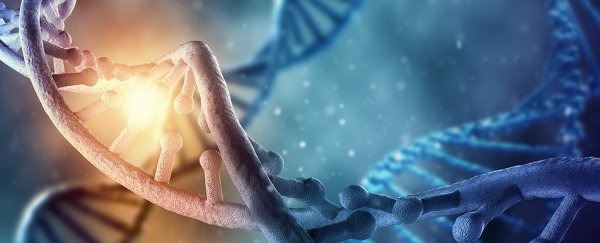Childhood is a defining period in anybody's life, but for many of us it seems those early life experiences could change the body right down to a genetic level.
Researchers can now accurately predict whether a handful of genes responsible for regulating inflammation are altered by identifying key childhood events, suggesting the illnesses we get later in life could be the result of events in our formative years.
A team of scientists from Northwestern University in the US analysed over a hundred genes associated with inflammation, looking for hints of epigenetic changes.
They were led by suspicions that links between childhood environments and differences in inflammation processes could come down to the genes themselves.
While our genome's DNA sequence is more or less locked in at conception, we've understood for some time that individual genes can continue to be modified through processes we refer to as epigenetic.
One of the more prominent forms of these epigenetic processes is methylation, which involves a methyl (CH3) group being added to the DNA's structure in such a way that it interferes with its function.
Methylation, along with other epigenetic changes, has revolutionised how we interpret our genetic blueprints.
Where once our biology was considered a genetic destiny, we've come to understand that even subtle environmental phenomena can have a knock-on effect that results in the silencing of key genes.
Epigenetics appears to have evolved to tweak our genomes in rapid response to changes in our surroundings.
"We could have genes in our bodies that might lead to some bad outcomes or adverse health outcomes, but if those genes are silent, if they're turned off due to epigenetic processes, that can be a good thing," the study's lead author Thom McDade explains to Lorena Infante Lara at Univision.com.
It's still relatively early days in terms of understanding the full range of epigenetic changes that can be wrought by everything from how we sleep to how wealthy we are.
Childhood is clearly an important part of life that can establish biological processes that can affect our health and wellbeing for years to come.
This latest study involved a sample of just under 500 participants from the Philippines, and included a trail of data that dated back to the early 1980s.
Blood collected in 2005 was used to analyse 114 genes associated with immune processes that regulate inflammation.
The methylation of nine of those genes was found to have a close relationship with a number of childhood variables including household socioeconomic status in childhood, extended absence of a parent in childhood, and even whether the person was born in the dry season.
This isn't the first indication of our birth season being stamped into our DNA and affecting our immune system, either.
In other words, by identifying certain childhood experiences, it was possible for the researchers to predict whether one or more of those nine inflammation genes would be on or off.
Inflammation can be something of a two-edged sword as far as immunity goes – while the opening of blood vessels and swelling that goes with it can help fight infections and promote healing, it can cause discomfort and damage if it persists.
Regulation of inflammation genes might help balance that cost under certain circumstances, but since the genes are then silenced – and rarely switched back on again – it could also open the way for sickness later in life.
The research could help explain the prevalence of cardiovascular and certain inflammatory diseases in specific communities.
It also adds to the ever growing body of evidence that highlights the diverse ways changes to our immune system can affect how our adult bodies cope with disease.
More research on the genes emphasised by the study could reveal additional clues on how the environment influences the functioning of our genes.
Meanwhile, we now have even more evidence that what happens to us early in our lives can stick with us for a long time to come.
This research was published in the Proceedings of the National Academy of Sciences.
